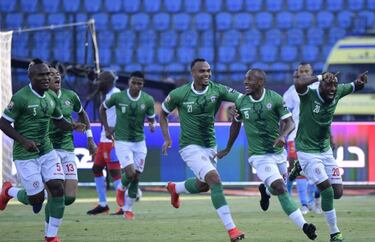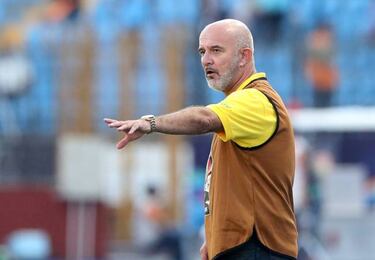Debutants Madagascar bring romance to Cup of Nations
Madagascar midfielder Anicet Abel can understand why the Africa Cup of Nations Cup (AFCON) debutants may have been under-estimated before the tournament.

Madagascar midfielder Anicet Abel can understand why the Africa Cup of Nations Cup (AFCON) debutants may have been under-estimated before the tournament.
"When we came here at the beginning of the tournament, nobody took us seriously but we believed in ourselves," he told Reuters. "Of course, they under-estimated us and I understand them -- Madagascar is not famous in football, I think Madagascar is only famous for the movie."
But, in one of the most remarkable stories in the competition's history, the team from the Indian Ocean island -- which apart from the animated film mentioned by Abel is probably best known for its unique wildlife -- have reached the quarter-finals and face Tunisia on Thursday.
Their romantic run to the last eight has caused such joy in the country that President Andry Rajoelina chartered a plane to take himself and supporters to the round of 16 match against Democratic Republic of Congo on Sunday, which Madagascar won on penalties following a 2-2 draw.

Yet, only five years ago, Madagascar had slumped to 187th out of 211 in the FIFA world rankings after being routinely dumped out of AFCON and World Cup qualifying competitions in two-leg preliminary-round ties.
According to coach Nicolas Dupuis, a number of players, such as Abel and Ibrahim Amada, had given on up the national side because "they did not think it was taken seriously".
But Dupuis, best known in his native France for leading fourth tier Yzeure to a French Cup win over Ligue 1 side Lorient in 2013, quickly set about changing that when he took over the running of the team in 2017.
"First of all, we changed the general organisation and the logistics," he told Reuters. "The accommodation, the travelling, we have made that more professional, and then on the playing level, I spent eight months building this team, looking for the best players Malagasy players around the world."

Dupuis asked his captain Faneva Ima Andriatsima, who plays for French Ligue 2 side Clermont, to scout around and try to find European-born players with Malagasy heritage who were able or wanted to play.
"Sometimes the answer was yes, sometimes no," he said.
But, even after Madagascar finished second in their qualifying group ahead of Equatorial Guinea and Sudan to book their place in Egypt, little was expected.
The country does not have a professional league while the Malagasy federation is under intervention from FIFA due to management problems.
Many of the squad play in the French second tier, while others are based in Bulgaria, Saudi Arabia, the United States, Algeria and Egypt -- far from the bright lights of La Liga, the Premier League and the Champions League.
Modest wage
Dupuis himself is also coaching French fourth tier club FC Fleury because he says his salary from the Malagasy federation "does not give me the minimal financial means to live".
"...I promise a great match.."
— CAF (@CAF_Online) July 10, 2019
We are waiting..😎#TotalAFCON2019 pic.twitter.com/VvQ1wrfsU9
When the tournament started, Dupuis admitted that Madagascar's first aim was to avoid making fools of themselves.
"We did not want to be ridiculed and we wanted to be worthy of the event," he said. They did far more than that as they won their group, beating Nigeria on the way, before knocking out Democratic Republic of Congo.
"We remain humble and lucid and aware that we will play against the 25th-ranked team which is complicated for the little Madagascar," he said. "We want to go as far as possible but if we stop here, that is also very good."
Dupuis said he preferred to avoid comparisons with Iceland who remarkably reached the quarter-finals at Euro 2016.
"We shouldn't compare something which isn't comparable," he said, adding that he had tried to create a family atmosphere within the squad. Our strength is the connection between the staff and the players. I am like their father, I love my players," he said.
"But, they also have footballing qualities, they can play good football and work well tactically, they learn all the time and from everyone."
Related stories
Andriatsima, 35, said he hoped Malagasy players would be given the chance to play at bigger clubs and that there would be investment in youth development back home, even if that was unlikely for the current generation.
"Most of us arrived in France at 23, 24, 25 years old and when you arrive in Europe at that age, it's hard to go up to the level above," he said. But I hope in any case that clubs and scouts and their partners will come to Madagascar from now on. I hope they go down there, look for young players and, why not, create training centres for young people where they could get a good return on their investment."